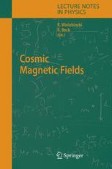Search
Search Results
-
Magnetic Fields in Galaxies
Magnetic fields are a major agent in the interstellar medium. They contribute significantly to the total pressure which balances the gas disk against...
-
Magnetic Fields in Galaxy Systems, Clusters and Beyond
The discovery of significant magnetic fields beyond our Milky Way was unwittingly made in the early 1950’s when new “discrete” cosmic radio sources...
-
Stellar Magnetic Fields
Stellar magnetic fields are directly detected or inferred across the whole Hertzsprung--Russell Diagram. Attention in this chapter is concentrated on...
-
Magnetic Fields in Diffuse HI and Molecular Clouds
The diffuse interstellar HI is the matrix within which many molecular clouds reside and the medium that soaks up the energy injected by sources such...
-
Magnetic Fields in the Early Universe
A substantial magnetic field could conceivably have been generated in the ultra-early Universe. However, the relevant physics at those eras is very...
-
Searching the Trans-Neptunian Region
The Edgeworth-Kuiper-Belt is considered to be the remnant of the formation disk of the planetary system around the Sun. For about 8 years the...
-
Course 15: Observations of the High Energy $\gamma$ -Ray Universe
This article describes the nature and current status of observational programs studying astrophysical high energy...
-
Course 1: Accretion and Ejection-Related MHD
This lecture is an introduction to MHD. Relevant equations, both in the classical and special-relativistic regimes are derived. The magnetic field...
-
Course 7: Cosmic Rays and Particle Acceleration at Astrophysical Shocks
The acceleration of particles in the vicinity of astrophysical shocks has become the main paradigm in astrophysics for the production of cosmic rays...
-
Course 12: Evolution of YSO Disks
As stars and planets form from accretion processes in disks, it is important to understand these processes and their evolutionary implications. While...
-
Course 11: Accretion Signatures in Young Stellar Objects
Mass accretion onto the star is taken place in young stellar objects, providing the energy needed to power the excess emission observed at all...
-
Course 8: The Black Hole Environments
Compact objects are astrophysical entities with radii smaller than about 10 Schwarzschild radii. The mass spectrum of these objects ranges from the...
-
Course 13: X-Rays from YSOS: Desperately Seeking the Central Engine
The earliest stages of the evolution of low-mass stars are characterized by the presence of powerful jets, likely originating from accretion via...
-
Course 6: Gamma-Ray Bursts
This lecture is an introduction to the study of gamma-ray bursts. Observations of the burst and its afterglow are first reviewed, with the...
-
Course 9: Accretion around Active Galactic Nuclei
In bright AGN, at distances of several Schwarzschild radii, the accretion onto a black hole proceeds predominantly in a form of a cool accretion...
-
Introduction
We summarize the topics presented in this book, and when appropriate we enlighten cross–references among the different topics: high precision and...
-
Cosmological Applications of Loop Quantum Gravity
After a brief introduction to classical and quantum gravity we discuss applications of loop quantum gravity in the cosmological realm. This includes...
-
Quantum Corrections to Scalar Quintessence Potentials
We give a brief introduction into the formalism of the effective action. We use the effective action to investigate the stability of scalar...
-
The Accelerating Universe and Dark Energy: Evidence from Type Ia Supernovae
I discuss the use of Type Ia supernovae (SNe Ia) for cosmological distance determinations. Low-redshift SNe Ia (...
-
Black Holes in Two Dimensions
Models of black holes in (1 + 1)-dimensions provide a theoretical laboratory for the study of semi-classical effects of realistic black holes in...
